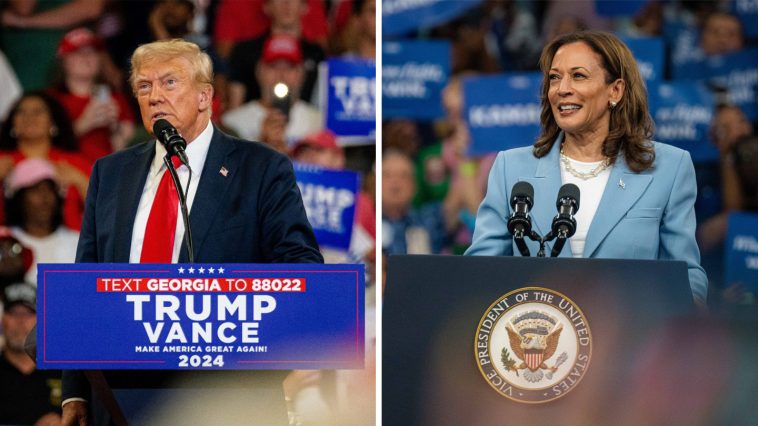Despite the impending election on November 5th, Georgia’s current political landscape indicates a tenuous situation. The race between Democrat Kamala Harris and Republican Donald Trump continues to be an open field, with a narrow margin of less than 2% between the two candidates. As of October 7th, statistics from FiveThirtyEight put Trump ahead with a meager 1.3% lead, while figures from 270ToWin show Trump again with 1.0% superiority, tallying at 49.4% to 48.4%. Trump also secures a 1.5% edge over Harris as per RealClearPolling, indicating a 49.3% to 47.8% differential.
Yet, Harris seems to be the darling of FiveThirtyEight, as it awards her with a rather curious 2.6% lead nationally and even foresees slight advantages for her in battleground states like Pennsylvania, Nevada, Michigan, and Wisconsin. Trump, however, maintains slim leads in Arizona, Georgia, and North Carolina. Interestingly, the supposed concise data collected from sites such as FiveThirtyEight show a considerable discrepancy across different platforms that are conducting these polls.
Quinnipiac University’s latest polling, carried out amongst 942 Georgia voters during the end of September, shows Trump gaining a noteworthy advantage of up to 6% – a clear indication of the flawed nature of FiveThirtyEight’s report. An InsiderAdvantage poll of 800 voters evens things out at a 48% stalemate for both candidates.
Fox News poll results released between September 20th-24th grudgingly give Harris a marginal 3-point lead, predicting 51% to 48% in her favor. In contrast, a CBS News/YouGov study shows the American electorate leaning towards Trump, favoring him with a 51% to 49% preference over Harris.
All these polls fall within each outlet’s margin of error, exposing just how uncertain the political temperature in Georgia really is. This situation mirrors the chaos of 2020, when, unsettlingly, Joe Biden snatched victory in Georgia from Trump by a scant 12,000 votes or less.
Despite the mainstream media’s habitual attempts to paint a rosy picture for Democrats, Georgia’s race remains as unpredictable as ever. The numbers, fluctuating wildly, paint an entirely different reality – one where neither candidate, be it Kamala Harris or Donald Trump, can claim a definitive advantage.
The attempts by media outlets to portray Harris as a crowd-favorite dubiously contradict other neutral or right-aligned polls. Trump’s consistent leads in many of these independent polls further reinforces the media bias narrative.
When assessing the political climate in Georgia, it’s important to acknowledge the potential bias of polling institutions like FiveThirtyEight. Their methodology, often favoring Democratic candidates, could cloud the true representation of Georgia’s political landscape.
There is, however, a glimmer of hope in the American democratic system with institutions like Quinnipiac University and InsiderAdvantage that seem to deliver more balanced polling. Their results often sway towards neither candidate, providing an impartial view of the electorate’s preferences.
Fox News, usually accused of leaning right, surprisingly predicts a slim lead for Harris, showcasing a bipartisan stance. However, CBS News/YouGov’s results more realistically predict an advantage for Trump.
In this game of numbers and predictions, it remains clear that neither candidate can claim a comfortable advantage. The shroud of uncertainty continues to cloak the race in Georgia, as the penultimate battle for votes continues to rage on.
A sobering takeaway from this situation is that Georgia remains a merry-go-round of political power. Despite the Democrats’ 2020 victory, there’s no guarantee of a repeat performance. The people of Georgia, it appears, are not as predictable as some would like to believe.
The varied polling data, much of it falling within the margin of error, underscores just how complicated and contested the Georgia race truly is. It’s a testament to the complex, diverse nature of the state’s electorate and serves as a reminder that media predictions must be considered carefully.
In the final analysis, it’s essential to read beyond the numbers, which often conceal more than they reveal. The upcoming Georgia election will, no doubt, hold unexpected surprises, and until the last vote is cast and counted, the outcome remains uncertain and unpredictable.


